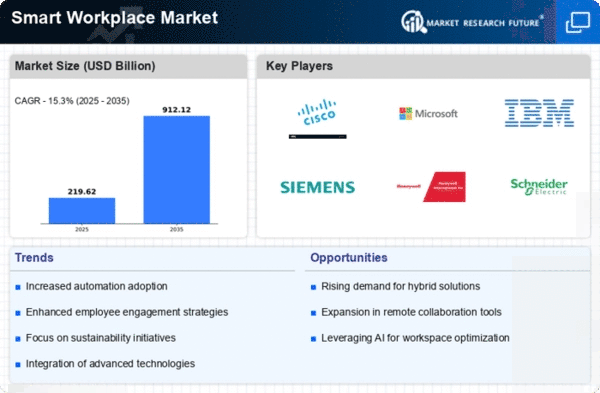Top Industry Leaders in the Smart Workplace Market

The Competitive Landscape of the Smart Workplace Market
The smart workplace market, transforming offices into vibrant, adaptive ecosystems. Navigating this dynamic and multifaceted space requires understanding the strategies adopted by workplace intelligence leaders, the crucial factors influencing market share, the influx of innovative players, and the overall competitive scenario.
Key Player:
- IBM
- Siemens
- Atos
- Accenture
- Zensar
- Schneider Electric
- Honeywell International
- Phillips Lighting Holding
- ABB Ltd
- Cisco Systems
- Infosys
Strategies Adopted by Leaders:
- Technology Prowess: Cisco Systems and Honeywell lead the charge with intelligent building management systems, advanced sensor networks, and data analytics platforms, setting the benchmark for automation and efficiency.
- Vertical Specialization: Schneider Electric focuses on energy management solutions for green buildings, while JLL caters to corporate clients with tailored smart office implementations and workplace consulting services.
- Partnership Play: Microsoft collaborates with leading smart building solution providers, offering integrated workplace software tools and cloud-based platforms for seamless data collaboration.
- Open-Source Platforms: The Open Connectivity Foundation promotes open-source standards for smart building devices, lowering entry barriers and fostering industry-wide interoperability.
- User Experience and Employee Centricity: Prioritizing intuitive interfaces, personalized settings, and employee well-being through features like smart lighting and biophilic design enhances user adoption and improves workplace satisfaction.
Factors for Market Share Analysis:
- Automation and Operational Efficiency: Companies offering solutions that automate lighting, climate control, and access control, while optimizing energy consumption and maintenance schedules, command premium prices and secure market share by delivering cost savings and operational improvements.
- Data Analytics and AI-Powered Insights: Integrating sensor data with AI algorithms for real-time occupancy analysis, resource optimization, and predictive maintenance enables proactive management and data-driven decision-making.
- Cybersecurity and Data Privacy: Robust security measures for building systems and data protection protocols compliant with stringent regulations are crucial for building trust and mitigating security risks.
- Scalability and Interoperability: Solutions that seamlessly integrate with existing infrastructure, adapt to various building sizes and types, and support open communication protocols offer greater flexibility and cater to diverse needs.
- Employee Experience and Well-being: Features that enhance employee comfort, promote collaboration, and support health and productivity through elements like ergonomic furniture and air quality monitoring attract and retain talent, increasing market appeal.
New and Emerging Companies:
- Startups like VergeSense and Comfy: These innovators focus on workplace experience platforms with features like desk booking, room scheduling, and employee engagement tools, catering to modern workplace trends and employee preferences.
- Academia and Research Labs: MIT's Center for Real Estate and Stanford University's Department of Civil and Environmental Engineering explore next-generation smart workplace technologies like self-healing materials and personalized climate control systems, shaping the future of the market.
- Material Science Innovations: Companies like Saint-Gobain and Corning Incorporated develop smart materials and building elements with integrated sensors and responsive capabilities, enhancing building functionality and data collection potential.
Industry Developments:
IBM:
- November 2023, Launched a new integrated smart workplace platform featuring AI-powered space optimization, employee experience tools, and security management capabilities.
- July 2023, Partnered with a real estate developer to implement their smart workplace solutions in a new office building, showcasing the technology's benefits in practice.
Siemens:
- October 2023, Introduced a new building management system with advanced energy optimization features and AI-driven predictive maintenance capabilities.
- June 2023, Acquired a startup specializing in indoor environmental quality monitoring and analytics, strengthening their smart building offerings.









